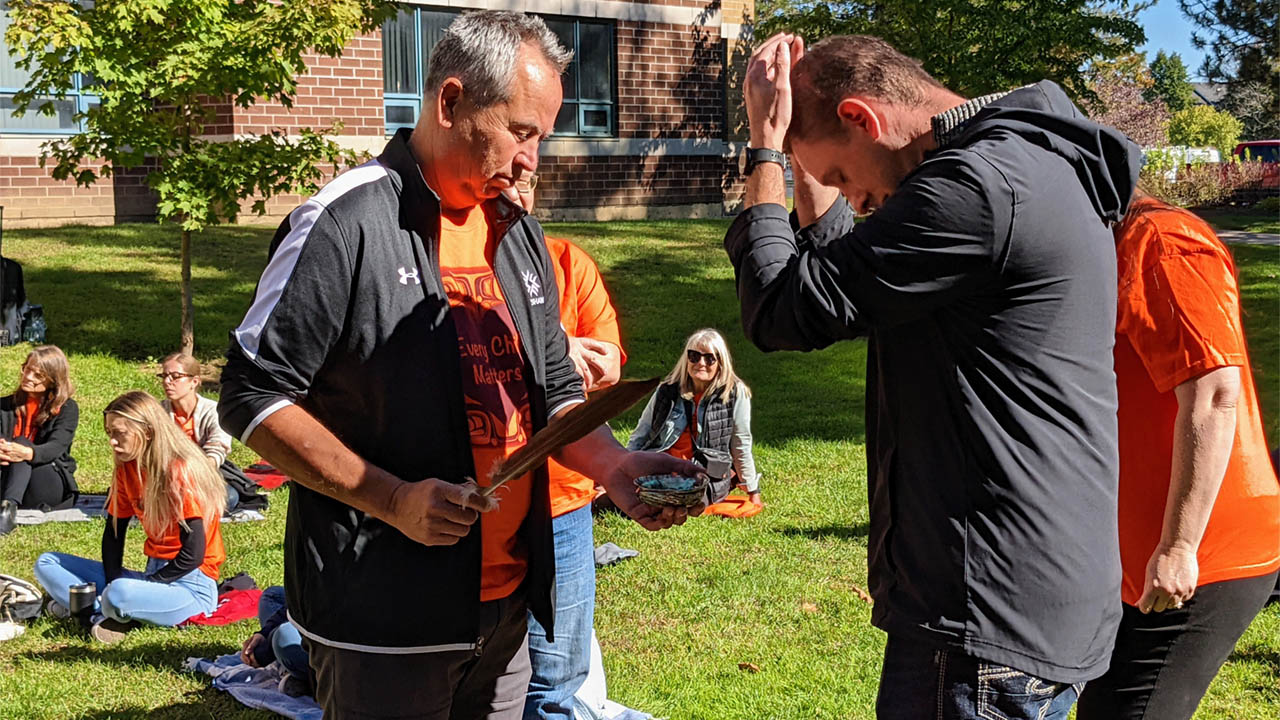Fanshawe hosts Truth and Reconciliation Week
 CREDIT: BEN HARRIETHA
CREDIT: BEN HARRIETHAOutside R Building at Fanshawe College, traditional medicine was brought around in a smudging ceremony as part of the week's events.
To commemorate the National Day of Truth and Reconciliation on Sept. 30, a week of events were hosted at Fanshawe College. Lessons on how reconciliation looks in different settings, book signings, and talks on what is meant by “Indigenous knowledge,” all culminated in a final event on the day itself, where the college shared what institutional actions it was taking.
Starting the week off, Anishinaabe and Haudenosaunee Knowledge Keeper, Liz Akiwenzie held a traditional opening at Kalihwíy̲o̲ Circle. Akiwenzie is a Residential School survivor, as well as a grad of the Social Service Worker program at Fanshawe College. This was followed by a lesson on circular thinking and how it relates to the education system. The entire session was drop-in and conversational, allowing people to ask any question they may have had about what was being shared.
Later that day, a book reading and signing with the author of Memory Keeper, Dawn C. Hill was held. Memory Keeper is a collection of memoir stories Hill wrote about her family and childhood. On Sept. 27, ceremony maker and Fanshawe faculty member, Paul Petahtegoose taught more about reconciliation in education, specifically about what that would look like in a classroom setting.
On Sept. 28, a panel of speakers shared stories and examples on demonstrating reconciliation in action at Fanshawe College. The speakers included Tamara Visser, Mary Harrison, Debbie Watson and Rob Downie. The final event before the official day of Truth and Reconciliation was a Keynote by Raven Sinclair titled “Indigenous Knowledge and the Path to Reconciliation.”
The presentation broke down what “Indigenous knowledge” actually means, along with the wisdom that comes along with that. Sinclair is Cree/Assinniboine/Saulteaux/ Métis and a member of George Gordon First Nation of the Treaty #4 area of southern Saskatchewan. She has been a faculty member at the University of Regina since 2005, specifically as a full professor at the Faculty of Social Work.
On Sept. 30, Fanshawe shared some of the actions it’s taking on an institutional level. The college created an “Indigenous Action Plan,” thanks to the Indigenous Education Council. Michele Beaudoin, Vice President of Student Services, shared some of the plans for the college going forward.
“We’re making space for Indigenous voices and perspectives to be heard at the senior leadership table…We’ve also invested in community hubs, creating opportunities for individuals to start their education journey in community, placing more emphasis on authentic, learning experiences.”
Indigenous people are also being consulted when it comes to construction at the college, including the currently-under-construction Innovation Village. Kalihwíy̲ o̲ Circle was also built with this same guidance.
Beaudoin also shared how the 326 self-identified first year Indigenous students are being eased into the college process.
“The Registrar has been working with the Indigenous Institute team to ease that transition for students recognizing that Indigenous, students come to the college often with different kinds of experience than non-Indigenous students. They’ve been assisting pretty much case by case with these new enrolments.”
Liz Akiwenzie, who delivered the opening ceremony on Sept. 30 as well, spoke on how things have changed at Fanshawe since she attended.
“I used to be here, 31 years ago. And if somebody would have said, this institution would acknowledge me, I would say, it would never happen in a million years. Because it wasn’t the most safe and exciting place to be.”
Akiwenzie added that she was glad she’s been able to be a part of the positive change and reconciliation process in post-secondary institutions like Fanshawe.
“Maybe one day when my grandbabies come to this institution, they’ll feel safe being who they are. So, I say miigwech for that.”

















